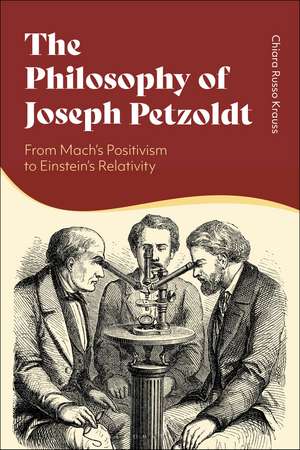The Philosophy of Joseph Petzoldt: From Mach's Positivism to Einstein's Relativity
Autor Chiara Russo Kraussen Limba Engleză Paperback – 21 aug 2024
| Toate formatele și edițiile | Preț | Express |
|---|---|---|
| Paperback (1) | 191.75 lei 22-36 zile | |
| Bloomsbury Publishing – 21 aug 2024 | 191.75 lei 22-36 zile | |
| Hardback (1) | 510.92 lei 43-57 zile | +109.94 lei 6-12 zile |
| Bloomsbury Publishing – 8 feb 2023 | 510.92 lei 43-57 zile | +109.94 lei 6-12 zile |
Preț: 191.75 lei
Preț vechi: 249.57 lei
-23% Nou
Puncte Express: 288
Preț estimativ în valută:
36.70€ • 39.88$ • 30.85£
36.70€ • 39.88$ • 30.85£
Carte disponibilă
Livrare economică 31 martie-14 aprilie
Preluare comenzi: 021 569.72.76
Specificații
ISBN-13: 9781350321496
ISBN-10: 1350321494
Pagini: 256
Dimensiuni: 156 x 234 x 25 mm
Greutate: 0.36 kg
Editura: Bloomsbury Publishing
Colecția Bloomsbury Academic
Locul publicării:London, United Kingdom
ISBN-10: 1350321494
Pagini: 256
Dimensiuni: 156 x 234 x 25 mm
Greutate: 0.36 kg
Editura: Bloomsbury Publishing
Colecția Bloomsbury Academic
Locul publicării:London, United Kingdom
Caracteristici
A reconstruction of Einstein's early ties with Mach's ideas in the interpretation provided by Petzoldt
Notă biografică
Chiara Russo Krauss is Professor of History of Philosophy at the Federico II University, Naples, Italy.
Cuprins
AcknowledgmentsList of Abbreviations 1. Introduction2. Stability and Eindeutigkeit3. Subjectivism and Relativistic Positivism4. Petzoldt and Einstein's Theory of Relativity5. Criticism of Petzoldt's Interpretation of Relativity6. Conclusion NotesBibliographyIndex
Recenzii
This book masterfully combines history of philosophy and history of ideas. It portrays Joseph Petzoldt (1862-1929) who creatively combined elements of thought of his teacher Richard Avenarius (1843-1896) and of the physicist-physiologist and philosopher Ernst Mach (1838-1916). Petzoldt developed a philosophy of "relativistic positivism" and became an influential interpreter of Einstein's theory of relativity. In her richly contextualized account, Chiara Russo Krauss discusses strengths and weaknesses of Petzoldt's thought.
Russo Krauss offers a rich and fascinating picture of Petzholt's positivism, including his accounts of the unity of science, the determinacy of law, and Einstein's theory of relativity. She shows him to be a significant bridge from nineteenth-century German philosophy to early analytic philosophy of science.
Chiara Russo Krauss's book on Petzoldt should be obligatory reading for anyone interested in German intellectual history from the 1890s to the 1920s. Russo Krauss situates Petzoldt in the philosophical debates of his time, illuminating not only Petzoldt's own wide-randing oeuvre, but also the work of those authors who influenced him, or who responded to him. The book is chock-a-block with intriguing historical and systematic insights. Russo Krauss' study sets a model of how best to discuss an allegedly 'minor' figure.
Russo Krauss offers a rich and fascinating picture of Petzholt's positivism, including his accounts of the unity of science, the determinacy of law, and Einstein's theory of relativity. She shows him to be a significant bridge from nineteenth-century German philosophy to early analytic philosophy of science.
Chiara Russo Krauss's book on Petzoldt should be obligatory reading for anyone interested in German intellectual history from the 1890s to the 1920s. Russo Krauss situates Petzoldt in the philosophical debates of his time, illuminating not only Petzoldt's own wide-randing oeuvre, but also the work of those authors who influenced him, or who responded to him. The book is chock-a-block with intriguing historical and systematic insights. Russo Krauss' study sets a model of how best to discuss an allegedly 'minor' figure.
